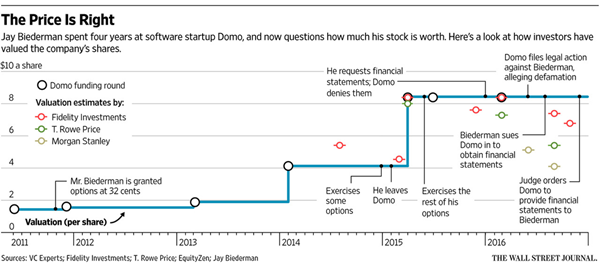|
THE
WALL STREET JOURNAL.
Tech
Former Employee Wins Legal Feud to Open Up Startup’s Books
Delaware ruling against Domo highlights shareholders’ rights as
companies stay private longer
|

Inside Domo’s office in American Fork, Utah. The startup shared
its audited financial statements with a former employee, after a
lawsuit.
PHOTO: JEFFREY D. ALLRED/THE DESERET NEWS/ASSOCIATED PRESS |
By
Rolfe Winkler
Jan. 26, 2017 8:00 a.m. ET
A former manager at
privately held Domo Inc. has prevailed in a legal fight to obtain
financial records from the company, affirming the rights of startup
investors and employee shareholders.
Last week, Jay Biederman
received Domo’s audited financial statements, according to people
familiar with the case, after a Delaware judge ruled last month that
he was entitled to the information so he can value his shares in the
business software company.
The ruling came nearly
seven months
after The Wall Street Journal chronicled
Mr. Biederman’s attempt to obtain the documents from Domo. Mr.
Biederman had sought the financial records for more than a year
before suing the company in
August in Delaware, where Domo is incorporated.
Mr. Biederman declined to
comment through an attorney.
Mr. Biederman’s victory
shines a spotlight on shareholders’ rights to inspect their company’s
books, an especially important privilege in an era when startups are
staying private longer and, as a result, avoiding mandatory public
disclosures.
Unlike publicly traded
companies, startups like Domo aren’t required by law to file financial
reports. Instead, mostly for competitive reasons, they typically keep
their revenue, profit and financial projections hidden from everyone
except their top investors.
Tech-startup valuations
also don’t fluctuate daily like the shares of publicly traded
companies. Venture investors typically set the valuations when
startups raise new financing every year or two. So it is difficult to
gauge how much these shares are worth without knowing a company’s
financial health.
It has been nearly a year
since
Domo was valued at $2 billion,
which would have made Mr. Biederman’s shares worth about $541,000. But
some mutual funds that hold the shares have marked them down as much
as 50% from that value, according to
The Wall Street Journal’s Startup Stock
Tracker, raising questions about the company’s current
value.
Mr. Biederman invoked
section 220 of Delaware’s corporate law to compel Domo to provide the
data, one of
a handful of rules that require
private companies to disclose their records to shareholders. The law
gives shareholders the right to inspect a company’s books, including a
list of stockholders, financial statements, articles of incorporation
and more, so long as they provide a “proper purpose” for their
request.
The judge in the Delaware
case, Sam Glasscock III, cited precedent in ruling in December that
Mr. Biederman’s purpose to value his shares was proper and directing
the company to provide audited financials.
At the time, the judge
said that the way Mr. Biederman “was treated at the beginning of his
request for documents was both unfortunate, and certainly…tested the
limits of good faith if not exceeded them.”
Part of the Delaware
dispute also was over provisions of the nondisclosure agreement that
Domo asked Mr. Biederman to sign in exchange for the financial
records, and additional documents related to his other allegations
against the company. The NDA was renegotiated and the judge asked Domo
to provide limited documentation related to the other allegations.
But the time Mr. Biederman
has spent waging his fight shows how difficult it can be for
shareholders to exercise such rights.
In January 2015, Mr.
Biederman, who was a strategic solutions manager at Domo according to
his LinkedIn profile, requested financial statements from the company,
and was fired a few days later, according to his complaint.
A year later, he asked for
the documents again, and Domo’s vice president of investor relations
responded in an email that “shareholders are not entitled to financial
information as a matter of law” since Domo is a privately held
company. Delaware
law states the opposite.
Two months later, in April
2016, Domo General Counsel Dan Stevenson sent him an email raising
questions about his request and threatening to sue him for breaching
his separation agreement.
Domo sued him in June, a
week after the first Journal story ran, filing two legal actions in
Utah where the company is based. One legal action was a demand for
arbitration alleging disparagement, the other a civil lawsuit in state
court alleging defamation and breach of contract.
The defamation case
pointed to allegedly “disparaging posts about Domo” that Mr. Biederman
put on his
Facebook page before the Journal
story ran. Domo claimed the posts—which included one that Domo says
suggested sexual harassment and drug abuse took place at the
company—harmed its business.
Mr. Biederman in September
won a motion in Utah state court to force Domo to arbitrate the
defamation claim, reducing his legal costs by consolidating the two
legal actions. The defamation claim was later dismissed after Domo
declined to arbitrate it, according to court transcripts. A separate
disparagement claim remains before the arbitrator.
To date, Mr. Biederman’s
Utah legal costs have totaled nearly $100,000, according to one of his
attorneys.
Write to
Rolfe Winkler
at
rolfe.winkler@wsj.com
|

